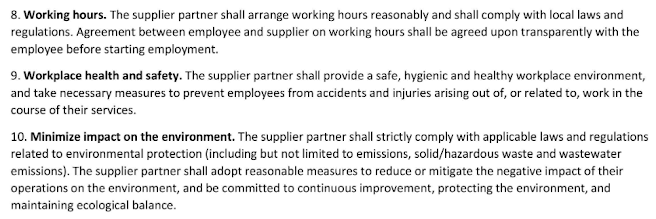Shein: Background Information
Shein, initially named 'SheInside,' was created in 2008 by
entrepreneur Chris Xu and has quickly become the world's largest online fashion
retailer. In 2014, the online retail giant established its own supply chain
center, with the official Shein app launching the following year. By 2022, the
company had become the most searched fashion brand in the world and achieved
over 100 million in sales. The lean business model focuses on minimizing losses
caused by unsold inventory by employing an aggressive marketing strategy,
resulting in a 98% sales-to-manufacture rate. The fashion giant has experienced
exponential growth in recent years, reaching over 10,000 employees and 6,000
suppliers. Shein prides itself on its ability to process thousands of new
designs each day, producing a seemingly never-ending variety of fashion pieces.
Marketing has been a major growth factor in the explosion of
Shein's popularity in the Western world. Many young clothing consumers have a
demand for 'in-trend' products but lack the necessary budget and income to
purchase them. Shein provides clothing items that are currently trending at
ridiculously low prices. The fashion retailer is not oblivious to this fact, as
much of the marketing is done through teenage Western influencers, usually on
YouTube and TikTok. This promotion often takes the form of 'Hauls,' in which
the influencer can obtain a set amount of products from Shein for free, in
addition to receiving payment for the video. The YouTuber and/or TikToker then
produces content showcasing the clothing and promoting a discount code, usually
around 20% but occasionally more, to drive followers to the site.
According to Shein, 'Shein is a global fashion and lifestyle
e-retailer committed to making the beauty of fashion accessible to all,' with
their mission statement being, 'Shein's mission is to serve as a leader in the
industry and bring fashion into the modern era.' The vision statement reads as
follows: 'We believe that the clothes we wear reflect our personalities, and we
want to empower everyone to explore and express their individuality.' It appears Shein believes its vision should only apply to
consumers, as their employees lack the personal time required to be 'empowered'
or 'express their individuality.' Shein's core values are: 'Customers, constant
improvement, and transforming the industry,' again demonstrating that consumers
and their satisfaction are the most important elements of the business model.
Constant improvement may be a positive sign regarding the ethical issues facing
suppliers and employees; however, past 'improvements' have provided little
evidence to support this.

Regarding the unethical behavior of clothing suppliers,
Shein states, 'While we do not have direct ownership of production facilities,
we recognize that our responsibilities extend throughout our supply chains. We
strive to work with suppliers who share our commitment to ethical practices and
respect for human rights.' Shein further states in their supplier code of
conduct, 'All new contract manufacturers of Shein branded products must undergo
a vetting process before starting to work with Shein.' This vetting process
supposedly includes a 'Shein Responsible Sourcing (SRS) audit' in order to
become a certified Shein clothing manufacturer. However, these promises are
rarely upheld, as violations have reportedly been occurring since before 2020
and still persist to this day.
Recently, in April 2023, Shein was found to be in violation of multiple labor violations. This United Kingdom investigation into a factory producing Shein clothing found that workers were paid a base salary of $556 per month while having their first month's pay withheld. Workers, in Chinese factories, were found to still be working 18-hour days and having only one day off per month, continuing to violate Chinese labor laws. One worker stated, "There's no such thing as Sundays here" with workers also experiencing financial penalties if they made mistakes on a piece of clothing. Shein's sustainability report from 2021 even states that 66% of Shein suppliers had "mediocre performance," meaning that there were 1-3 major risks present in the workplace. These issues have been present for multiple years with Shein claiming to invest further in the supply chain to fix them, but these issues still persist to the current day.
Sources:
https://sheingroup.com/about-us/#:~:text=SHEIN%20is%20a%20global%20fashion,fashion%20into%20the%20modern%20era.
https://www.cbsnews.com/news/shein-controversy-why-is-it-so-popular/
https://www.dailymail.co.uk/femail/fashion/article-11756233/The-truth-worlds-fastest-fashion-brand.html
https://goodonyou.eco/how-ethical-is-shein/
https://us.shein.com/SUPPLY-CHAIN-TRANSPARENCY-STATEMENT-a-1091.html
https://donegood.co/blogs/news/the-hidden-sweatshop-labor-force-behind-shein#:~:text=Does%20Shein%20violate%20labor%20laws,pay%20was%20withheld%20from%20them.
https://sheingroup.com/corporate-news/2021-sustainability-and-social-impact-report/





Significant ethical concerns Shein's rapid success in the fashion industry. The company's marketing strategies, leveraging influencers and offering low-cost trendy items, raise about ethical consumer practices.
ReplyDelete